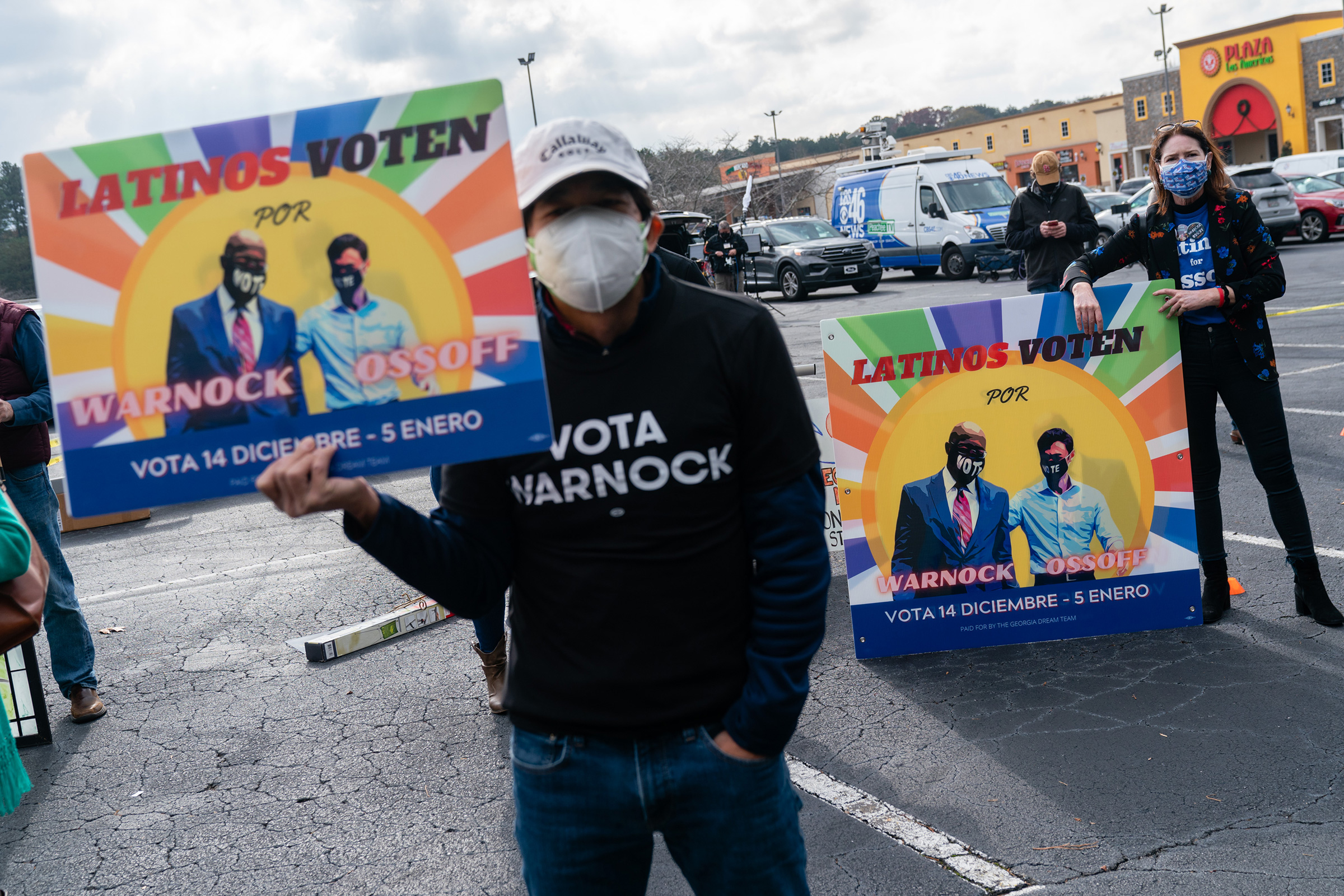
Michelle Zuluaga voted for the first time in the 2012 presidential election, in her home state of Georgia. A first-generation Colombian whose parents and brother were deported nearly 15 years ago, she was the only person in her immediate family who was able to cast a ballot.
Now, at 28, she is playing a key role in mobilizing Latino voters ahead of the Jan. 5 runoff elections in Georgia that will determine control of the U.S. Senate.
“I never grew up seeing my parents being civically active, because they couldn’t,” says Zuluaga, a civic participation manager at the Latino Community Fund (LCF) Georgia, which joined with other groups to launch a non-partisan voter initiative, Latinos for Democracy. “I want our Latino community to understand the power of civic engagement and the power of their vote.”
Latino voters could be decisive in Georgia’s Jan. 5 runoffs, which are being held because no candidate for either of the state’s two Senate seats cleared 50% in the November elections. According to U.S. Census Bureau data, Georgia’s Hispanic population grew 96% between 2000 and 2010. The state currently has nearly 1 million Latino residents, including hundreds of thousands of young first-generation Latinos like Zuluaga. AP’s Votecast survey found that of Georgia’s 5 million voters in November, 3% were Latino and 60% voted for President-elect Joe Biden.
To reach these voters, LCF Georgia, based in Atlanta, has partnered with a coalition of other Latino-led organizations to contact nearly 500,000 Latinos in the area via text banks, mailers and literature drop offs.
The four candidates in the runoffs—Republican incumbents Senators Kelly Loeffler and David Perdue and Democratic challengers Rev. Raphael Warnock and Jon Ossoff—understand the Latino vote could be critical. All are ramping up spending on Spanish-language TV and radio advertisements. Loeffler and Perdue have tried to attract Latino voters by pitching themselves as best positioned to strengthen the economy, while Warnock and Ossoff have stressed their plans for immigration policy and COVID-19 relief.
With huge numbers of young Latinos aging into the political process, organizations like Voto Latino, the nation’s largest Latino voter-registration group, have been working overtime to engage Latino youth across the U.S. They’ve registered over 600,000 individual Latinos this year—36,000 of them from Georgia, a state Biden won by just over 12,000 votes. Since November, Voto Latino has partnered with Fair Fight, La Borinquena and former Democratic legislator and voting-rights activist Stacey Abrams to get more Georgians registered, as well as get those that went to the ballot box in November to show up again at the start of the new year.
“We recognize that our Latino community has particular needs that oftentimes go unnoticed,” says Maria Teresa Kumar, President and CEO of Voto Latino. “Young Latinos are expected to navigate America for their families, but they don’t always have access to information. We want Latinos to be a partner in democracy and at the table.”
Getting people to the polls twice in roughly two months is no easy feat. Kumar says the biggest challenge is getting young Latino communities to understand why voting for the Senate is just as important as voting for the presidency. The organization has emphasized that the Biden Administration’s ability to deliver on issues like student-debt relief, climate change and immigration reform hinges partly on the Senate contests.
While initiatives like LCF and Voto Latino work to fire up the Latino base, obstacles to the ballot box remain. Language is one barrier, particularly for many older, Spanish-speaking Latino immigrants in the state. Of Georgia’s 159 counties, only Gwinnett County in suburban Atlanta, which has one of the largest Latino populations in the state, has a mandate to make voting materials available in Spanish. It doesn’t help that Latinos in Georgia, including many Cubans and Venezuelans who fear the communism and socialism their families fled, have also been subject to election misinformation over the years.
Now Latino voters may play a role in determining the winner of a crucial Georgia election for the second time in less than three months. “[Of my family] I was the only one born here, so I was the girl with a golden ticket,” says Zuluaga of LCF Georgia. “I just want to make the most of my golden ticket and have others understand the power of theirs.”
More Must-Reads from TIME
- Why Biden Dropped Out
- Ukraine’s Plan to Survive Trump
- The Rise of a New Kind of Parenting Guru
- The Chaos and Commotion of the RNC in Photos
- Why We All Have a Stake in Twisters’ Success
- 8 Eating Habits That Actually Improve Your Sleep
- Welcome to the Noah Lyles Olympics
- Get Our Paris Olympics Newsletter in Your Inbox
Write to Mariah Espada at mariah.espada@time.com
